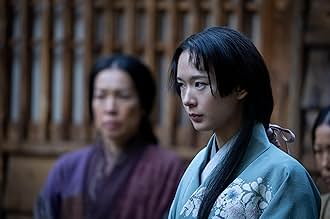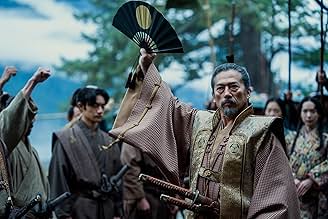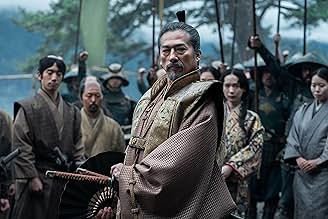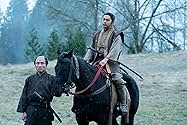Blackthorne and Mariko test their new alliance as they train Toranaga's gun regiment for war. Yabushige must navigate his past promises to Ishido when an old friend comes to the village.Blackthorne and Mariko test their new alliance as they train Toranaga's gun regiment for war. Yabushige must navigate his past promises to Ishido when an old friend comes to the village.Blackthorne and Mariko test their new alliance as they train Toranaga's gun regiment for war. Yabushige must navigate his past promises to Ishido when an old friend comes to the village.
Featured reviews
This one gave us some great development on Mariko, as she slowly starts to open up, remimding us that you can never know what is going inside peoples heads, who they are and whether you know their goals!
This episode really gave me a feeling that perhaps we dont know everyone as well as we think we do, especially after the brutal last scene, that left me with no clue on what to expect next!
The visuals and settings were beautifull! I almost felt like i was transported to most captivating locations of rural Japan! This show really nails the tone and message and never feels like it is compromising!
An episode that makes everything that came before seem like mere background setup as here the plot develops in a big way. Episode 1 was most setup but Episodes 2 and 3 developed the plot and characters quite well. It did still feel like things were being put into place rather than moving forward.
Here, things move forward, and how. The best episode so far, covering all manner of action and drama. The personal relationships, especially that between Blackthorne and Mariko, are developing nicely and a semi-new character is introduced that has a major impact on Blackthorne's character arc.
The political machinations are every present and here they offer up a quandary for Yabushige and lead to a major development in the story.
Incredibly engaging and exciting. Can't wait to see what Episode 5 delivers.
4th episode called "The Eightfold Fence" was a slower yet rewarding experience in comparison with 3rd part. This time it's all about teaching tactics and finding yourselves in a new environment. It was a gorgeous looking episode with some good interactions between characters. I liked the dialogs in here, as they fleshed out characters, well, only two of them. And slowly I can already see we're things are going, I guess. The show started to slip into its trajectory, and it doesn't feel unique no more. It's not a bad thing if done right. And if it's done right we will see in next 6 episodes.
The episode begins with Toranaga, played with gravitas by Toshiro Mifune, continuing his strategic machinations against his political rivals. The title "The Eightfold Fence" alludes to Toranaga's multifaceted schemes, as he builds alliances and plays his enemies against each other. Mifune's performance is stellar, as always, and his portrayal of a man who must constantly stay ten steps ahead of his foes is both commanding and subtle. The direction by Jerry London shines here, with slow-burning tension building in every scene where Toranaga negotiates and plots. The pacing in these political segments is deliberate, but never dull, as the stakes feel increasingly higher.
On the other hand, Blackthorne's journey in this episode takes a more personal turn. Richard Chamberlain once again brings nuance to the role as Blackthorne struggles to reconcile his Western values with the demands of life in Japan. This internal conflict is heightened when he is forced to confront the brutality of samurai justice. A particularly memorable scene shows Blackthorne witnessing the harsh consequences of disloyalty, leaving him shaken. The scene is executed with an air of cold detachment that serves to highlight the stark differences between the Japanese code of honor and Blackthorne's Western sensibilities. This moment not only advances Blackthorne's character arc but also reinforces the broader theme of cultural clash that defines the series.
The cinematography in "The Eightfold Fence" is one of the standout elements of the episode. The contrast between the lush, serene landscapes of Japan and the intense political and personal conflicts playing out within these settings is visually striking. There is an ethereal beauty in the natural scenery that is often juxtaposed with the harsh realities of life in the samurai world. The use of wide shots to capture the grandeur of the environment, followed by tight, claustrophobic framing in moments of personal conflict, enhances the overall viewing experience. These visual choices help to keep the audience invested, even during the slower-paced dialogue-heavy scenes.
Despite the many strengths of the episode, there are moments where the pacing feels uneven. The scenes involving the political intrigue are engaging, but there are a few sequences where the focus on Blackthorne's continued assimilation feels repetitive. While necessary for character development, some of these moments could have been condensed to maintain the episode's momentum. This issue is particularly noticeable in the latter half of the episode, where the story briefly loses focus before picking up again in the climactic scenes. However, the strong performances and the overarching narrative keep these slower moments from detracting too much from the episode as a whole.
In terms of performances, Yoko Shimada's portrayal of Lady Mariko continues to impress. Mariko plays an increasingly central role as she guides Blackthorne through the complexities of Japanese society. Their interactions are laced with unspoken tension, as Mariko walks a fine line between being a loyal subject and someone who clearly cares for Blackthorne's well-being. The chemistry between Chamberlain and Shimada is undeniable, and it adds an emotional layer to the episode. Mariko's internal conflict, torn between duty and personal feelings, is one of the most compelling aspects of the series so far, and Shimada delivers this with grace and strength.
In conclusion, "The Eightfold Fence" is a thought-provoking episode that deepens the political and personal stakes of Shogun. The episode excels in its exploration of the themes of loyalty, honor, and cultural identity, and the performances by the lead actors continue to elevate the material. While there are moments where the pacing falters, the strong direction and breathtaking cinematography make up for these minor shortcomings. The episode sets the stage for what is sure to be an even more intense conflict as the series progresses, leaving the audience eager to see how the various storylines will converge. It remains a visually stunning and intellectually engaging chapter in a series that masterfully blends historical drama with personal storytelling.
Full of dreamy, rainy Japanese scenery in the smaller village, as the Anjin finds himself in an increasingly better living situation and finds a way to make himself much more valuable to Team Toranaga than even he expected.
Great character development and relationship development in this one, as two characters emerge from their background roles to alter the course of the main plot. I enjoyed the shocking (and graphic) twist at the end that is not for the feint of heart!
Can't wait to see where this goes from here, particularly how Toranaga gets himself out of this huge mess.
Did you know
- TriviaIn Japan, moss is regarded as an essential element: a symbol of harmony, age, and tradition. For at least 1,000 years, Zen monks have celebrated its presence in written descriptions of temple landscapes. Even in these tiny spaces, moss joins the disparate pieces, knits rock to earth, pulls individual plants into unified compositions. Covering the surface of the earth, mosses strongly express the landform. But at the same time, they are so fragile that you cannot step on them. Because moss doesn't grow dramatically overnight, it takes years and years to cover the surface of a stone, and it is also perfect for erosion control. This coexistence of visual strength and physical fragility is what makes mosses so compelling to the human mind.
- GoofsDuring the intimate scene between Kashigi Omi and his lover, a nicotine patch is clearly seen on Kashigi Omi's upper left arm (closest to camera)
- Quotes
Toda Mariko: Do you know "The Eightfold Fence"? From the time we are small, it is something we are taught to build within ourselves. An... impenetrable wall, behind which we can retreat whenever we need. You must train yourself to listen without hearing. For instance, you can listen to the sound of a blossom falling or the rocks growing. If you really listen, your present circumstance vanishes. Do not be fooled by our politeness. Our bows, our maze of rituals. Beneath it all... we could be a great distance away. Safe. And alone.
- SoundtracksMain Title (Shogun)
performed by Atticus Ross, Leopold Ross & Nick Chuba
Details
- Runtime
- 57m
- Color
- Sound mix
- Aspect ratio
- 2.00 : 1






























